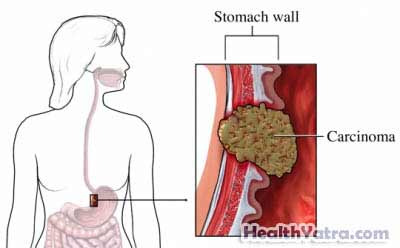Definition
Stomach cancer is a disease in which cancer cells grow in the stomach. Stomach cancer can develop in any part of the stomach and spread to other organs through tumor growth, the bloodstream, or the lymphatic system.
There are five layers of tissue in the stomach. The innermost layer is called the mucosa and is where approximately 90% to 95% of stomach cancer begins. This type of tumor is called an adenocarcinoma.
Less common stomach cancers include:
- Lymphoma—a cancer of the immune system; sometimes found in the stomach wall
- Gastric stomal tumors—tumors of the stomach wall
- Carcinoid tumors—tumors of the hormone-producing cells of the stomach
It is believed that stomach cancer takes several years to develop. Many precancerous changes that rarely cause symptoms occur before stomach cancer develops. This is why most cases of stomach cancer are undetected until the later stages of the disease.

Causes
The exact cause of stomach cancer is not known. There are, however, several well-known risk factors that contribute to the development of stomach cancer.
Risk Factors
A risk factor is something that increases your chance of getting a disease or condition. The risk factors for stomach cancer include:
- Age: over 50
- Gender: twice as common in men
- Geography: Japan, Korea, parts of Eastern Europe, and Latin America experience higher rates
- Race: higher rates in Hispanics and African-Americans
- Helicobacter pylori infection
- Diet
- High intake of smoked, salted, pickled food and meat, high starch/low fiber foods
- Low intake of certain vegetables (eg, garlic scallions, onions, chives, leeks)
- Smoking
- Alcohol abuse
- Previous stomach surgery
- Pernicious anemia
- Ménétrier disease (a disease that causes large folds in the stomach lining)
- Barrett’s esophagitis
- Blood type A
- Familial cancer syndromes: hereditary nonpolyposis colon cancer and familial adenomatous polyposis
- Family history of stomach cancer
- Stomach polyps
Symptoms
If you have any of these symptoms, do not assume it is due to stomach cancer. These symptoms may be caused by other conditions. Tell your doctor if you have any of these:
- Indigestion, heartburn
- Abdominal pain or vague abdominal discomfort
- Nausea and vomiting
- Diarrhea or constipation
- Stomach bloating or sense of fullness after eating
- Loss of appetite
- Weakness, fatigue
- Bleeding in vomit or stool
- Stool that has turned black or tarry
- Unintended weight loss
- Fluid swelling in abdomen
In some cases, there may not be symptoms.
Diagnosis
Your doctor will ask about your symptoms and medical history. She will also do a physical exam. Diagnostic tests may include:
- Blood tests
- Fecal occult blood test —to check for blood in the stool
- Upper GI series —a series of x-rays of the esophagus, stomach, and duodenum (the first part of the small intestine)
- Endoscopy —a test that uses a fiberoptic scope to examine the esophagus (throat), stomach, and upper part of the small intestines
- Biopsy —removal of a sample of stomach tissue to test for cancer
- Ultrasound —a test that uses sound waves to examine the stomach
- CT scan —a type of x-ray that uses a computer to make pictures of structures inside the stomach
- PET scan —a test makes images that show activity in body tissues
Treatment
Stomach cancer is most often detected in the later stages. Stomach cancer is treated based on the location, size, stage, and extent of disease. Treatment options for stomach cancer include:
Surgery
Surgery is the most common treatment for stomach cancer. The type of surgery depends on the stage of the disease. There are three types of stomach surgery that may be done:
- Endoscopic mucosal resection —This surgery is generally done in the early stages where the tumor is removed through an endoscope.
- Subtotal gastrectomy —This is the removal of the lower part of the stomach, leaving part of the stomach to reattached to the esophagus and small intestine.
- Total gastrectomy —This is the removal of the entire stomach. It often includes removal of nearby lymph nodes. The esophagus is attached directly to the small intestine.
Radiation Therapy
This is the use of high-energy rays to kill or shrink cancer cells. Radiation therapymay be used after surgery to destroy cancer cells that could not be seen or removed during surgery.
Combined Treatment
In cases where stomach cancer has spread, chemotherapy combined with radiation therapy may increase the risk of survival and reduce the risk of cancer returning. Chemotherapy is the use of drugs to kill cancer cells. It may be given in many forms including: pill, injection, or via a catheter. The drugs enter the bloodstream and travel through the body killing mostly cancer cells, but also some healthy cells.
Prevention
The rate of stomach cancer has declined over the past 60 years due in large part to dietary factors. The change from salting and pickling foods to refrigerating foods for preservation is thought to have played a large role in this decrease. Prevention includes:
- Avoid diets high in salted, pickled, and smoked foods.
- Eat at least five servings of fresh fruits, vegetables, and whole grain foods a day.
- Limit red meat intake.
- Do not smoke.
- Do not drink alcohol.
